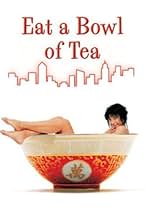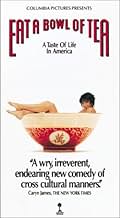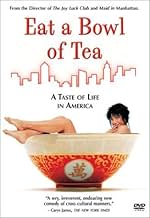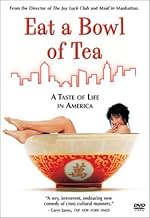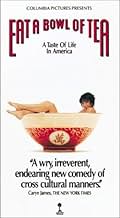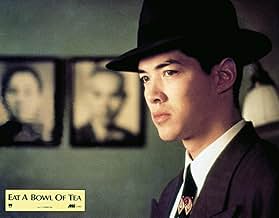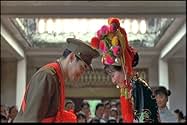Ajouter une intrigue dans votre langueA study in culture bridging, including ... a new US-born husband, trying to work within the traditional ways, a new China-born wife, eager to join the "dream" of America, two family-minded f... Tout lireA study in culture bridging, including ... a new US-born husband, trying to work within the traditional ways, a new China-born wife, eager to join the "dream" of America, two family-minded fathers, lots of gender-related social bifurcations.A study in culture bridging, including ... a new US-born husband, trying to work within the traditional ways, a new China-born wife, eager to join the "dream" of America, two family-minded fathers, lots of gender-related social bifurcations.
- Réalisation
- Scénario
- Casting principal
Sau-Kei Lee
- Bok Fat
- (as Lee Sau Kee)
Siu-Ming Lau
- Lee Gong
- (as Lau Siu Ming)
Fan Hui
- Ben Loy's Mom
- (as Hui Fun)
Helena Law
- Aunt Gim
- (as Law Lan)
Yuen-Yee Ng
- Third Sister
- (as Ng Yurn Yee)
Ta Lei
- Movie Translator
- (as Lui Tat)
Eric Tsang
- Ah Song
- (as Eric Tsang Chi Wai)
Wai Wong
- Chuck Ting
- (as Wong Wai)
Yu-Yung Teng
- Fat Man
- (as Tang Shun Nin)
Michael Ming-Yang Lee
- Old Lum
- (as Michael Lee)
Wing-Tat Woo
- Sum Woo
- (as Woo Wang Tat)
Avis à la une
Focusing on a little-known aspect of Chinese-American history – that Chinese men who had travelled to the States to make their fortune were prevented by federal law from marrying a native girl and from bringing their sweethearts over from China – director Wayne Wang crafts a pleasant story without really exploring the theme's full potential.
Asian heartthrob Russell Wong plays Ben Loy, a Chinese-American former serviceman in post-WW2 New York, who is allowed to marry a girl from the homeland following a relaxation of the laws due to the assistance given to America by China during the conflict. Fixed up by his wily old father (Victor Wong) with the daughter of a friend, Ben travels back to China and instantly (and fortuitously) falls in love with Mei Oi (Cora Miao, Wayne Wang's wife). Bringing her back to America, however, triggers a series of events that threatens both their marriage, and their entire family's standing in the Chinese-American community.
This is one of those films that, in the first act, looks as if it is going to turn out to be something special. But, sadly, things begin to unravel shortly after the young couple return to the States, and what could have been an insightful exploration into a culture and way of life that is alien to most of us becomes little more than a light rom-com. Ben, under pressure from both a new job that is more challenging than he expected and from a tight-knit community keen to welcome the arrival of the first child born to native parents, finds himself unable to perform in the bedroom. Mei Oi's eventual response to this is as unbelievable as it is cruel, and shoehorns a melodramatic plot that really has no place in a film that seemed to be setting itself up as a gently observed character piece. To add insult to injury, the manner in which it is resolved is equally unrealistic; so many questions are left unanswered, and the conclusion is so badly rushed that it devalues much of the good work that has gone before.
There is no doubt that Wang is an extremely talented director; he composes some wonderfully evocative frames and has a keen eye when it comes to the use of colour and shadow, but his control of narrative structure – in this film at least – is poor, leaving a talented cast to flounder in the second act, and seemingly lose interest midway through the third. Of course, Wang can only do what he can with the story handed to him, and writer Judith Rascoe must shoulder her share of the blame: by asking us to care for a couple about whom we are told so little – both as a couple and as individuals – and who seem to have little direction outside of complying with the wishes of their parent's, she leaves herself open to charges of naivety at best and, at worst, literary laziness.
Asian heartthrob Russell Wong plays Ben Loy, a Chinese-American former serviceman in post-WW2 New York, who is allowed to marry a girl from the homeland following a relaxation of the laws due to the assistance given to America by China during the conflict. Fixed up by his wily old father (Victor Wong) with the daughter of a friend, Ben travels back to China and instantly (and fortuitously) falls in love with Mei Oi (Cora Miao, Wayne Wang's wife). Bringing her back to America, however, triggers a series of events that threatens both their marriage, and their entire family's standing in the Chinese-American community.
This is one of those films that, in the first act, looks as if it is going to turn out to be something special. But, sadly, things begin to unravel shortly after the young couple return to the States, and what could have been an insightful exploration into a culture and way of life that is alien to most of us becomes little more than a light rom-com. Ben, under pressure from both a new job that is more challenging than he expected and from a tight-knit community keen to welcome the arrival of the first child born to native parents, finds himself unable to perform in the bedroom. Mei Oi's eventual response to this is as unbelievable as it is cruel, and shoehorns a melodramatic plot that really has no place in a film that seemed to be setting itself up as a gently observed character piece. To add insult to injury, the manner in which it is resolved is equally unrealistic; so many questions are left unanswered, and the conclusion is so badly rushed that it devalues much of the good work that has gone before.
There is no doubt that Wang is an extremely talented director; he composes some wonderfully evocative frames and has a keen eye when it comes to the use of colour and shadow, but his control of narrative structure – in this film at least – is poor, leaving a talented cast to flounder in the second act, and seemingly lose interest midway through the third. Of course, Wang can only do what he can with the story handed to him, and writer Judith Rascoe must shoulder her share of the blame: by asking us to care for a couple about whom we are told so little – both as a couple and as individuals – and who seem to have little direction outside of complying with the wishes of their parent's, she leaves herself open to charges of naivety at best and, at worst, literary laziness.
This is not a great movie, but is still quite good. The story involves Chinese men who suddenly have the chance to marry. Up until then, US immigration quotas separated families in an effort to limit an influx of the Chinese. They did so by allowing MEN into the country but not women! The movie moves at a nice leisurely pace and I had no serious complaints. It's just that there are better stories about the clash between traditional and modern Chinese culture (such as in Eat, Drink, Man, Woman). Still, considering how few movies about Chinese or Chinese-Americans exist, this pretty makes this movie a must-see for the curious viewer.
Ignore the picture that was used as the poster of this film, it is completely incongruous to the story. This is a film set in New York's Chinatown about a couple, one an Americanized Chinese young man (Ben Loy) who agrees to marry a young lady (Mei Oi) from a small village in China. She comes to New York and the story is the struggle of their compatibility. The movie is set in the late 1940's/early 1950's and it has a good rhythm to it. Most of it is in English, but that doesn't matter. At times you feel like a voyeur, looking in on this couple and wondering what will happen next to them. They do have their problems, and she even takes on a lover (Eric Tsang, who has a smallish but pivotal part), but the story is about the clash between Chinese traditions and their present day. While the film is good, it partly suffers from melodramatic overload. If you're interested in seeing a film about the immigrant experience, this is a good one about the Chinese one. I saw it on TCM in the wee hours of the morning. I watched it through, so that in and of itself is an endorsement.
in the times that every time you see new york now; woody Allen, Pollokaville, there are always scenes of the trade towers that are no longer with us, but although this film is situated in New Yoik, there are no scenes of the outside world. Why is this. and why do the Chinese suffer such great difficulties in New York. A film by wayne wang based on a book which was thought to be forgotten until the chinese literature came into a period of renaissance in the 1970s, Wayne wang named after the actor John Wayne, ironically this wasn't even his real name, it was something like marilyn, so either or, Wayne Wang was always going to be called after an American icon, much to his parents desire. The film juxtaposes culture; chinese onto the new setting; New York. it does this with a relationship at the centre and the chinese culture surrounding this relationship. For the chinese in this film; mostly men, as they have moved to New york to send back money to china, a woman is seen as a much needed asset, an asset that enables the continuing of their culture and their family in their new found land. the woman, has this pressure put upon her and so does the man, ben loi, the man impotent, and the woman cuckolds him to make the rest of the family happy, This film is a great insight into the Chinese and the idea of an alien in a foreign country, both with ben loi going back to china to marry and his wife to be coming over to America, Was it sting wha sang WOOOaaah I'm an alien, I'm a little alien, i'm an englishman in New York.
I recommend also Do the Right thing by Spike Lee
I recommend also Do the Right thing by Spike Lee
We selected this film on the merits of the many famous HK actors involved, so I didn't notice its labeling as a 'comedy' until we got it home. True, it has comedic moments, but so does the Bourne Identity.
The review here also lists the film as Mandarin with English subtitles; it is in Cantonese, with some characters speaking a regional dialect.
The story centers around that period in US history just after WWII where, for the first time, Chinese immigrants were allowed to apply for full citizenship and allowed to bring wives from China; the story follows a young ex-serviceman whose father sends him home to bring back one of the first of these wives. In a few days he's thrust from the club-hopping carefree vet to take his full traditional role as First-Son with all it's trappings and responsibilities, all this on top of he and his wife being one of the first of their kind, a true Chinese-American family.
Put yourself there, you'll agree, this is a lot to heap on a pair of 20-somethings, it wears them down, things fall apart.
It is, in a sense, the same old story, as they say, boy meets girl, boy loses girl, boy finds girl, love always wins, love never loses, put your money on love sort of story, well shot, well put together. It's about an important time in our history while also an important time in all our lives, nothing to shower with awards, but a good story well told and well worth the rental.
The review here also lists the film as Mandarin with English subtitles; it is in Cantonese, with some characters speaking a regional dialect.
The story centers around that period in US history just after WWII where, for the first time, Chinese immigrants were allowed to apply for full citizenship and allowed to bring wives from China; the story follows a young ex-serviceman whose father sends him home to bring back one of the first of these wives. In a few days he's thrust from the club-hopping carefree vet to take his full traditional role as First-Son with all it's trappings and responsibilities, all this on top of he and his wife being one of the first of their kind, a true Chinese-American family.
Put yourself there, you'll agree, this is a lot to heap on a pair of 20-somethings, it wears them down, things fall apart.
It is, in a sense, the same old story, as they say, boy meets girl, boy loses girl, boy finds girl, love always wins, love never loses, put your money on love sort of story, well shot, well put together. It's about an important time in our history while also an important time in all our lives, nothing to shower with awards, but a good story well told and well worth the rental.
Le saviez-vous
- AnecdotesThe movie's ''Eat a Bowl of Tea'' title is a literal English translation to a Cantonese Chinese phrase that means "take your medicine" or "swallow your medicine".
- ConnexionsFeatured in The Slanted Screen (2006)
Meilleurs choix
Connectez-vous pour évaluer et suivre la liste de favoris afin de recevoir des recommandations personnalisées
- How long is Eat a Bowl of Tea?Alimenté par Alexa
Détails
Box-office
- Montant brut aux États-Unis et au Canada
- 231 423 $US
Contribuer à cette page
Suggérer une modification ou ajouter du contenu manquant


